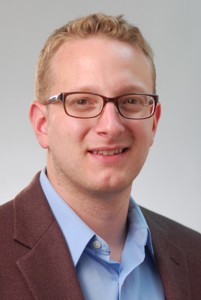
UC Appoints Ohio Eminent Scholar to Study Sensors
The University of Cincinnati has named a new Ohio Eminent Scholar, an electrochemist from the University of Maryland, Baltimore County.
Ryan White will work closely with the universitys colleges and hospitals to develop new biosensor applications. Sensors are one of UCs primary investigative clusters.
White, 35, has published numerous
on biosensors and was honored in 2016 by the Society for Electroanalytical Chemistry for his work.
Its a unique position geared to someone who can create collaborative opportunities, White said of the UC appointment. My research has been tied to engineering, chemistry and medicine. The position is a great opportunity to strengthen and grow a research program with ties to these other fields.
The Ohio General Assembly created the Ohio Eminent Scholar program in 1983 to help universities recruit talented faculty. Since then at least 19 other states launched similar recruitment programs, according to a 2007 study in the Journal of Higher Education.
One of the major interdisciplinary research thrusts at UC is in sensing, said Teik C. Lim, dean of the College of Engineering and Applied Science. Dr. Whites area of education and research fits really well in this research thrust.
Lim said Whites broad background will enable him to collaborate with other faculty and staff at UC and the Cincinnati Childrens Hospital Medical Center. He will work with the
College of Engineering and Applied Science
, the
McMicken College of Arts and Sciences
and the
.
His research is expected to attract funding from industry, which may lead to opportunities for commercialization and faster translation from research to practice, Lim said.
Bill Heineman, a distinguished professor of chemistry, said White is a leader in his field.
When this proposal was written for this Ohio eminent scholar, we wanted someone who could bridge engineering and chemistry, Heineman said. Sensors are a very collaborative field of research.
Heineman, who served on the search committee and co-authored the Ohio Eminent Scholar proposal, said UCs study focus will help attract top graduate students who will further the universitys work.
Engineering professor Andrew Steckl, also an Ohio Eminent Scholar, said UC is producing a wide array of health-related sensors that both diagnose medical issues and help treat them. But new sensors also can be applied in industry and to the environment to monitor pollution. And increasingly, they have applications for people who want to improve their personal health or physical performance.
Theyre called the worried well, people who are in decent health but might want to get better and measure how well they are doing, Steckl said. With Fitbit and Garmin, its a booming area of applications.
White was recognized last year with a Young Investigator Award from the Society for Electroanalytical Chemistry. He received fellowships from the National Institutes of Health, the Santa Barbara Foundation and the University of Utah.
UC also hired members of Whites study team, Mirelis Santos Cancel and Robert Lazenby.
White is a graduate of the University of North Carolina. He earned a doctorate in chemistry from the University of Utah. He and his wife, Whitney, have two preschool-aged children, Benjamin and Austin.
White said he would like to use his expertise to study genetic disorders such as fragile X syndrome, the leading inherited cause of intellectual disability.
When you boil things away, everything we do is rooted in electrochemistry. To think about how our research could impact society, we have to think about the potential applications. Its hard to do that in a vacuum, White said. Getting collaborators on the front lines of these problems really helps guide what we do.
Related Stories
Preparing students for artificial intelligence in education
May 8, 2025
Laurah Turner, PhD, associate dean for artificial intelligence and educational informatics at the University of Cincinnati's College of Medicine, recently joined the For The Love of EdTech podcast to discuss the usage of personalized learning and AI coaches to enhance educational experiences.
UC lab-on-a-chip devices take public health into home
May 8, 2025
University of Cincinnati engineers created a new device to help doctors diagnose depression and anxiety. The “lab-on-a-chip” device measures the stress hormone cortisol from a patient’s saliva. Knowing if a patient has elevated stress hormones can provide useful diagnostic information even if patients do not report feelings of anxiety, stress or depression in a standard mental health questionnaire.
UC engineering camps leave lasting impact
May 8, 2025
Every summer, hundreds of local and out-of-state high school students come to the University of Cincinnati for immersive, enriching, engineering experiences through various summer camps. Hosted by the Office of Professional Development and Community Impact at the College of Engineering and Applied Science, these camps not only ignite students’ passion for STEM, but also introduce them to life on a college campus.
